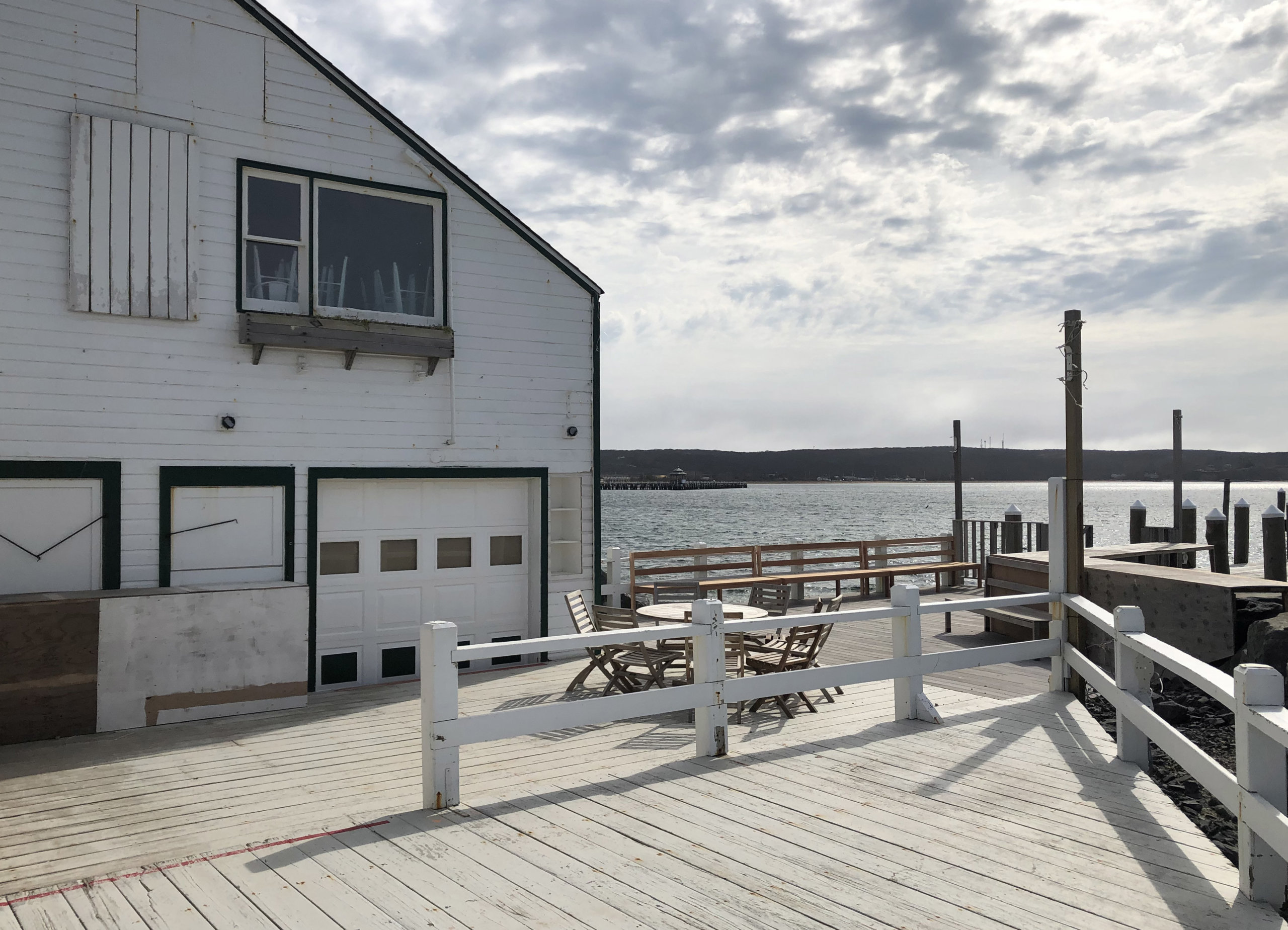East Hampton Seeks Duryea’s Do-Over


The East Hampton Town Board is seeking to overturn the agreement its attorney struck with Marc Rowan that allows him to continue operating Duryea’s Lobster Deck as a restaurant. Independent/T. E. McMorrow
State Supreme Court Justice David Reilly on Thursday, April 11 agreed to issue a temporary restraining order, preventing a settlement between East Hampton Town and Marc Rowan, the owner of the Duryea’s Dock complex in Montauk, from going forward. Reilly issued the order after the five members of the town board, the town’s chief building inspector, Ann Glennon, and town attorney Michael Sendlenski, as well as Rowan appeared in his Riverhead courtroom.
The day before Reilly’s ruling, Steven Stern, the attorney the town hired last month to represent it, had filed a motion to vacate the agreement, leading the judge to order all interested parties to court.
Three of the board members testified, including Supervisor Peter Van Scoyoc, Councilman Jeffrey Bragman, and Councilwoman Sylvia Overby. Glennon and Sendlenski, who was represented by his own attorney, Anthony Pasca, also testified.
Sendlenski had both negotiated and signed off on the agreement with Rowan, which settled three open lawsuits Rowan’s attorney, Michael Walsh, had filed against the town in 2018, as well as a series of code violation charges town ordinance officers had brought against Duryea’s Lobster Deck, the part of the complex generating most of the controversy. Rowan wants to operate a restaurant on the site, for which he needs a special permit from the town’s planning board.
Walsh, along with another of Rowan’s attorneys, Edward Burke Sr., had been pursuing a site-plan review before the East Hampton Town Planning Board for the permit needed to operate the Lobster Deck as a restaurant. That review will now be put on hold, pending Reilly’s final decision.
The settlement became the eye of a political firestorm, starting with a town board session February 21, during which David Buda, a frequent observer and critic of town government, criticized it.
That led to a lengthy follow-up by Bragman, who was critical of the deal. “I don’t think we fought hard enough for the town,” Bragman said at the time. “I don’t think we fought hard enough for Montauk. And, frankly, after reading the paperwork and seeing what is going on here, I don’t want to be the one to explain to the surfer guys or gals in Ditch Plains why a side order of fries is now 18 bucks.”
Sendlenski then took to the podium and got into a protracted and heated exchange with Bragman.
At the same time Reilly was hearing testimony, Walsh’s office was applying to the East Hampton Town Zoning Board of Appeals, asking that it overturn an action by Glennon, in which she rescinded a certificate of occupancy she had issued for Duryea’s Dock complex in February. That CO was part of the settlement Sendlenski had negotiated.
In an affidavit on file at ZBA’s office, Glennon makes it clear that she felt pressured to issue the certificate for Duryea’s. In an email she sent Sendlenski before issuing the CO, she asked, “Is the town board aware of what we are giving them?”
On February 21, two days after she had issued the CO, Glennon wrote Sendlenski, “I feel I have been put in a difficult situation.”
She also states in the affidavit that, while she did issue the CO, she took the unusual step of adding to the certificate the words, “per court stipulation.”
Affidavits are also on file at the ZBA from Councilwomen Sylvia Overby and Kathee Burke Gonzalez. Both state, “I never saw a draft settlement agreement before it was executed by Mr. Sendlenski and the court. The first time I received any copy of any version of the settlement agreement was February 5, 2019, when Mr. Sendlenski circulated the so-ordered agreement to the town board.”
Both say, in the same words, that they were concerned about how the settlement “limited the scope of the planning board’s site-plan review.” The settlement calls for the planning board to review only aspects of the stipulation, in an expedited fashion. Both women also state that when the board retained Stern’s services on March 12, it was specifically to “invalidate the settlement because it was never approved by the town board.”
Stern was not available for comment this week. Walsh, however, spoke at length about the court action, and the appeal to the ZBA.
What did the town board members know, and when did they know it? That appears to be the central question, according to Walsh.
He said April 12 that Sendlenski briefed the board twice, once in early December, and once in mid-January. Walsh said that Sendlenski circulated the signed settlement on February 5, yet there seemingly were no objections raised until the February 21 firestorm, with the board having met four times between the two dates.
Walsh also pointed to a comment made by Van Scoyoc at the town board meeting on February 21. During an exchange with Bragman, in which the councilman questioned whether the town board had fought hard enough for its constituents, Van Scoyoc replied, “Four out of five of us worked really hard on this.”
If four of five board members had “worked really hard” on the settlement, how could they have been blindsided by it? Walsh asked.
Walsh also said that the town’s planning board has not adhered to the settlement. Walsh said that, far from expediting the process, the planning board appears to be dragging its feet. During a March 6 initial site-plan review, Gabriele Maas, who is with Walsh’s firm, asked the board if Duryea’s could be put on the calendar for the planning board’s March 20 meeting, in order to respond to the East Hampton Town Planning Department’s preliminary memo on the site plan, as well as to comments made to the board by opponents of the settlement.
The request for the March 20 date was denied. “I don’t think that anybody has read the application,” Walsh said. “We would like to come in and explain our memo.”
t.e@indyeastend.com



